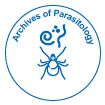Our Group organises 3000+ Global Conferenceseries Events every year across USA, Europe & Asia with support from 1000 more scientific Societies and Publishes 700+ Open Access Journals which contains over 50000 eminent personalities, reputed scientists as editorial board members.
Open Access Journals gaining more Readers and Citations
700 Journals and 15,000,000 Readers Each Journal is getting 25,000+ Readers
Useful Links
Share This Page
Venkata S Amarnath Pisipati

Venkata S Amarnath Pisipati
Department of Chemistry and Chemical Biology
Harvard University
USA
Biography
Venkata S Amarnath Pisipati is working as a Post-doctoral fellow at Department of Chemistry and Chemical Biology, Harvard University. His present work is profiling of 'Fully Synthetic Antimicrobials' against Gram positive and Gram negative bacterial strains. Previously worked as post-doc/Lab Manager at Department of Medical Microbiology, University of Manitoba, Canada. He pursued PhD at University of Manitoba from 2008-2015. Earlier to this, he has worked at various designations at Discovery Research, Dr. Reddy's Laboratories Ltd. (currently Aurigene Discovery Technologies), Hyderabad, India from 2001 - 2008. His research interests are in profiling antibacterial new chemical entities in both in vitro and in vivo models of infection. He is expertise in standardizing and working with advanced infection models such as systemic infection, thigh infection model, lung infection model, pyelonephritis model, septic shock model in mice and rats. He has a good experience in performing in vitro evaluation of NCEs (New Chemical Entities) in different models such as MICs(CLSI guidelines), MBC, Time kill studies, Post Antibiotic Effect (PAE), Post antibiotic sub-MIC effect (PA-SME), SME, Agar dilution method, Antibacterial combination studies to determine the antagonism, synergism and indifference by agar dilution method, effect of protein binding on the MICs and identifying the hit molecule in in vitro and identify the lead molecules and profile further in in vivo models. He is well experienced in evaluating hit molecules against anaerobic bacterial strains as well as evaluating the hemolytic and cytotoxic effect of NCEs on RBCs and various cell lines respectively.
Research Interest
Profiling antibacterial new chemical entities in both in vitro and in vivo models of infection

 Spanish
Spanish  Chinese
Chinese  Russian
Russian  German
German  French
French  Japanese
Japanese  Portuguese
Portuguese  Hindi
Hindi